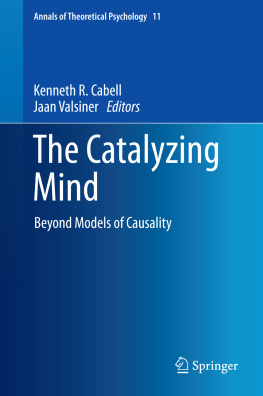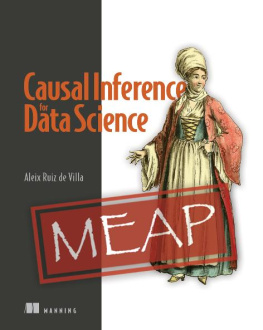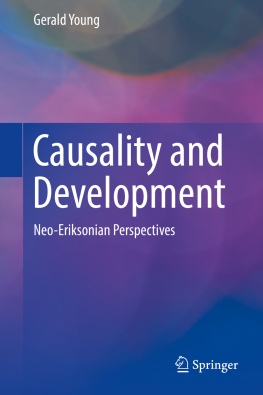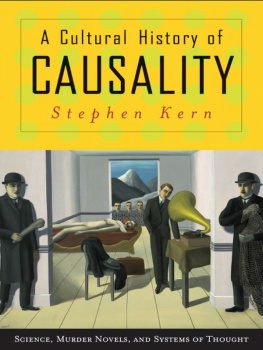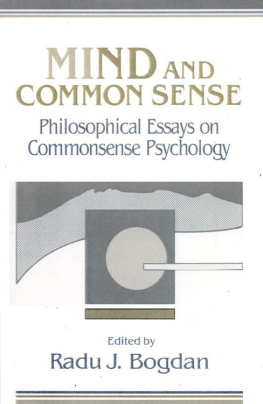1. Systematic Systemics: Causality, Catalysis, and Developmental Cybernetics
Abstract
This book, The Catalyzing Mind: Beyond Models of Causality , began from our quest to achieve three goals for the discipline of psychology, and more specifically, as elaborated within a semiotic cultural psychology. Cultural psychology is a newup and coming (Cole, 1996, Cultural psychology: A once and future discipline. Cambridge: Harvard University Press) research field of interdisciplinary kind. It is older in its history than the experimental psychology tradition (of Wilhelm Wundt and his opening of the first experimental psychology laboratory in 1879) dating back to the Vlkerpsychologie of the 1850s. The first professorship in the World that bore the name psychology was that of Moritz Lazarus in University of Berne, Switzerland, in 1860, with his Lehrstuhl in Vlkerpsychologie. However, in the middle of social negotiations about how psychology could be a science, (Valsiner, 2012, A guided science: History of psychology in the mirror of its making. New Brunswick: Transaction Publishers) it was the experimental psychology tradition that expelled the study of complex human phenomena out of the realm of concerns of hardcore experimentalists who happily substituted the behavior of a white rat to stand in for the psyche of all human beings. The rat had no aesthetic attitudes towards the mazes he or she was forced to run, nor sophisticated ideas about investment of ones behavioral capacities for the sake of future gains. The rat did not drink champagne, show herself in fashion shows, construct nuclear bombs, or paint the ceiling of the Sistine Chapel. Human beings did all of thatand much more. Their pilgrimage to arts, sciences, and geographic explorations were willful, complex, and often unrewardedat least during their lifetimes.
Traditionally the principle of unidirectional causal relationship has become so internalized in the thinking of the natural as well as human scientist that the notion of multilateral mutual simultaneous causal relationship was inhibited, repressed and did not occur in the scientific thinking, or when it occurred, it was discarded as unscientific, illogical or circular argument.Maruyama , p. 41
This book, The Catalyzing Mind: Beyond Models of Causality , began from our quest to achieve three goals for the discipline of psychology, and more specifically, as elaborated within a semiotic cultural psychology. Cultural psychology is a new up and coming (Cole ) it was the experimental psychology tradition that expelled the study of complex cultural phenomena out of the realm of concerns of hardcore experimentalists who happily substituted the behavior of a white rat to stand in for the psyche of all human beings. The rat had no aesthetic attitudes towards the mazes he or she was forced to run, nor sophisticated ideas about investment of ones behavioral capacities for the sake of future gains. The rat did not drink champagne, show herself in fashion shows, construct nuclear bombs or, paint the ceiling of the Sistine Chapel. Human beings did all of thatand much more. Their pilgrimage to arts, sciences, and geographic explorations were willful, complex, and often unrewardedat least during their lifetimes.
It is amidst the complexity of the human condition of meaningful future-oriented conduct (in opposition to the efforts to reduce psychology to the study of behavior ) that the need arises for developing new models of conceptual and theoretical analysis. It is precisely this sentimentthe need for new models of theoretical and conceptual analyses of higher-order, complex, psychological phenomenathat lead us to formulate the following questions for authors to focus on in this volume:
Do causal models fit the complexity of phenomena studied in psychology? What are causal models? How are they defined? how are they used?
Are there other modelsbetter modelsthat allow for understanding and explanation of complex phenomena in psychology?
Is it possible to use these other models to derive general laws of higher psychological functioning and behavior?
Before the authors of this volume begin to answer these questions from their own unique perspectives, we will lay the theoretical groundwork that we hope will open the door to a theoretical and empirical dialogue that might one day result in an answer for each of the questions mentioned above. This theoretical groundwork will include:
The concept and criteria of causality
The concept and criteria for the normal distribution
The concept and criteria of the second cybernetics
The concept and criteria of catalysis .
This theoretical groundwork for an alternative explanatory system for higher and complex mental and behavioral phenomena in psychology may bring about bigger questionswhat is knowledge? What is science? What is psychology? What does the discipline of psychology study? What do various methods tell us? What counts as data? What is required for a psychological fact, law, or generalization? This is just a small sample of questions that this book begins to question, problematize and reconceptualize.
From our point of view, science is about generating a body of knowledge. Psychology, being a science, focuses on human experiences and the thoughts, feelings and behaviors that make these experiences meaningful. Putting these definitions together, the question becomes what kind of knowledge can result from focusing on lived experiences and their meaningful cultivation? The answer to this question is a focus on typesa focus on different types of (semiotic) mechanisms by which individuals make their experiences meaningful. These types are classified according to their function and allow for explanatory laws to be built. Kurt Lewinone of the key figures in the twentieth century psychologyemphasized such a focus on types back in the 1920s under the label of Conditional-Genetic Types (Lewin ) . Lewin was far ahead of his timesfocusing on the general and conditional nature of concrete psychological events . He laid the foundation for a new kind of science of psychologyneither behavioral nor mental, but one that looks for general laws of human conduct that are uniqueconditionally bound to the present situation. He could have discovered the notion of catalysis back then in the 1920simporting it from chemistry where it was well recognized after Wilhelm Ostwalds Nobel Prize for it, in 1909. But he did notit was physics rather than chemistry that fascinated Berlin Gestalt psychologists in the 1920s.
Before a version of scientific psychologyqualitative and conditionalis proposed, we must make explicit why the old axioms of a scientific psychology do not fit the goals of our research, while focusing on new axioms. This introduction, and the chapters to follow, try to do just that. Contrary to the focus on elementary psychological functionsbe these behavioral or mentalwe start from human psychological phenomena of highest complexity. Consider the following questions: How do we understand the sacredness of a religious experience? How do we explain the honor experienced when serving for ones country? Or defending the honor of a woman in a duel in the nineteenth century? What does it mean to experience respect , duty , or obligation and how does this operate within our everyday experiences? All theseand many others of similar kindare qualitative phenomena that cannot be measured in the habitual act of a psychologist assigning numbers to them. Quantification here loses the richness of these experiences. Statistics loses the heterogeneity of these experiences. Unidirectional linear causality loses the complexity of the experiences. The power of the complexity of human psychological phenomena that matters in everyday life forces psychology as science to re-think its methodological habits .

